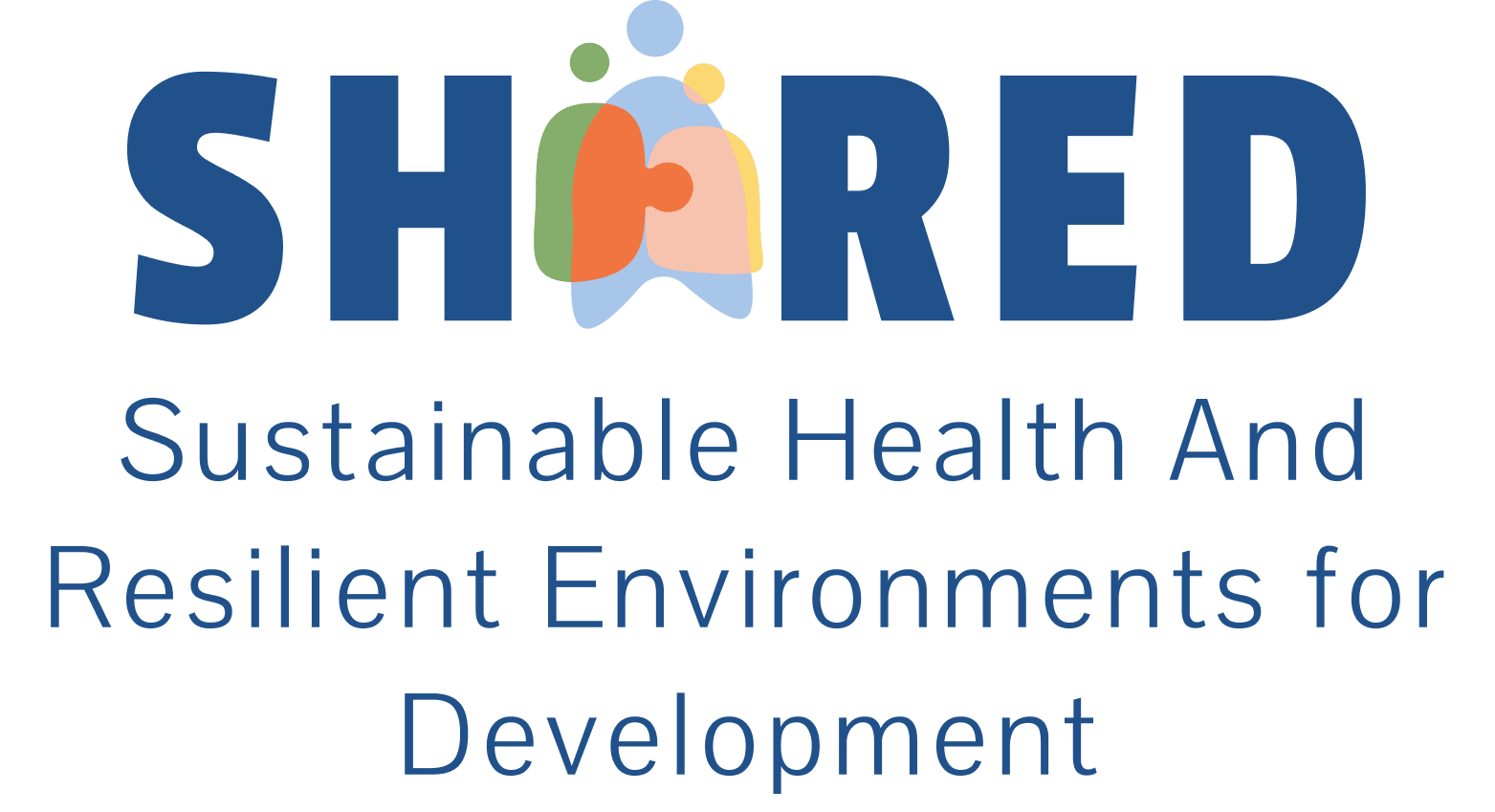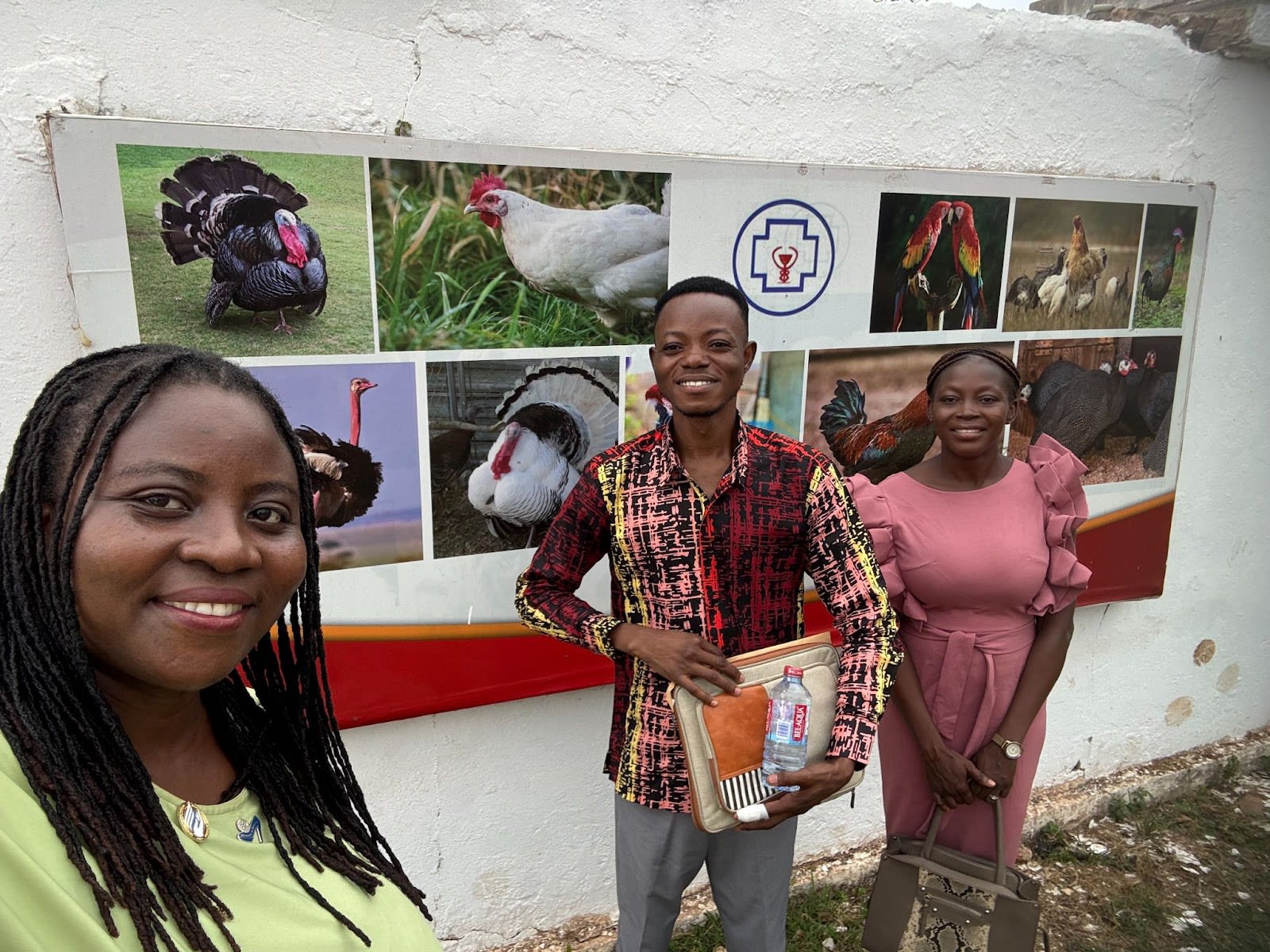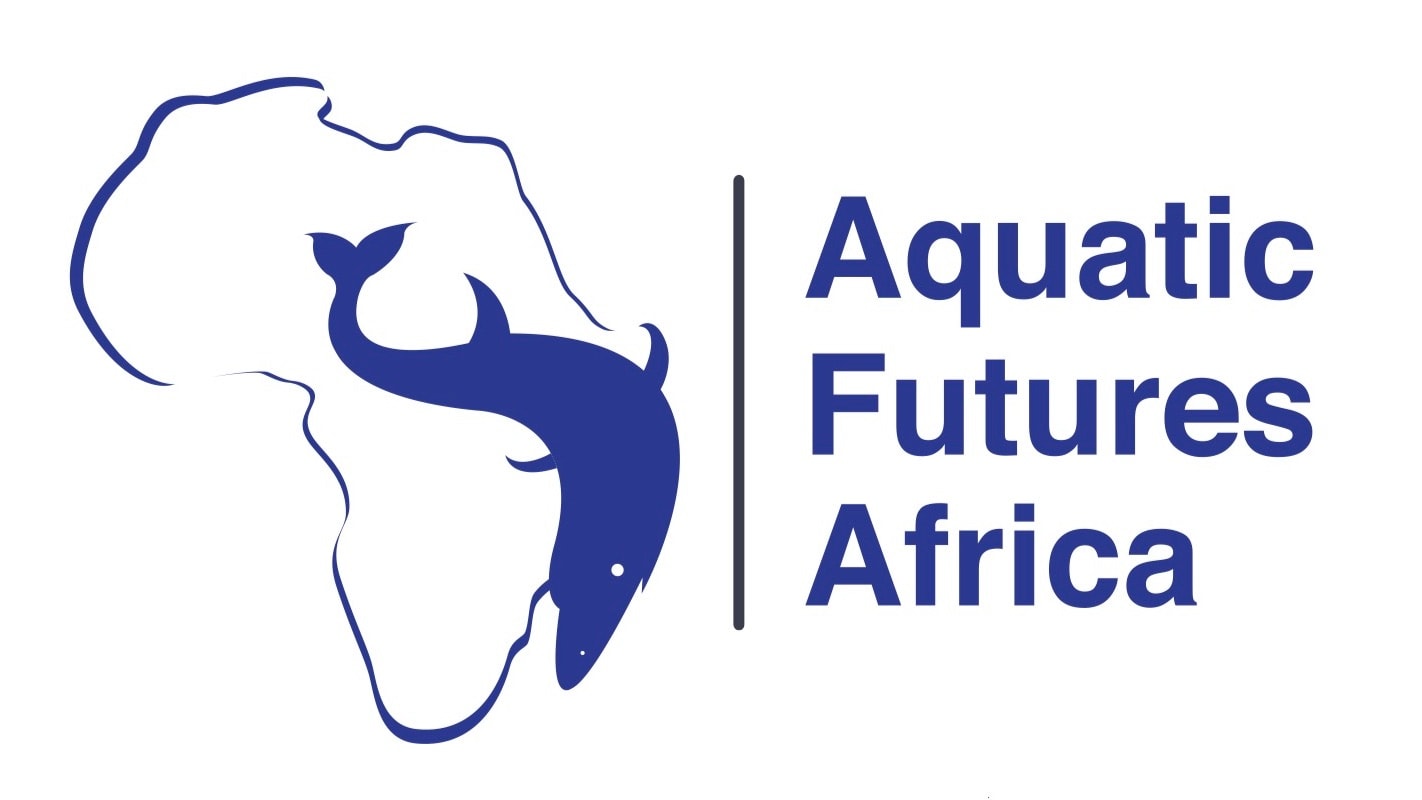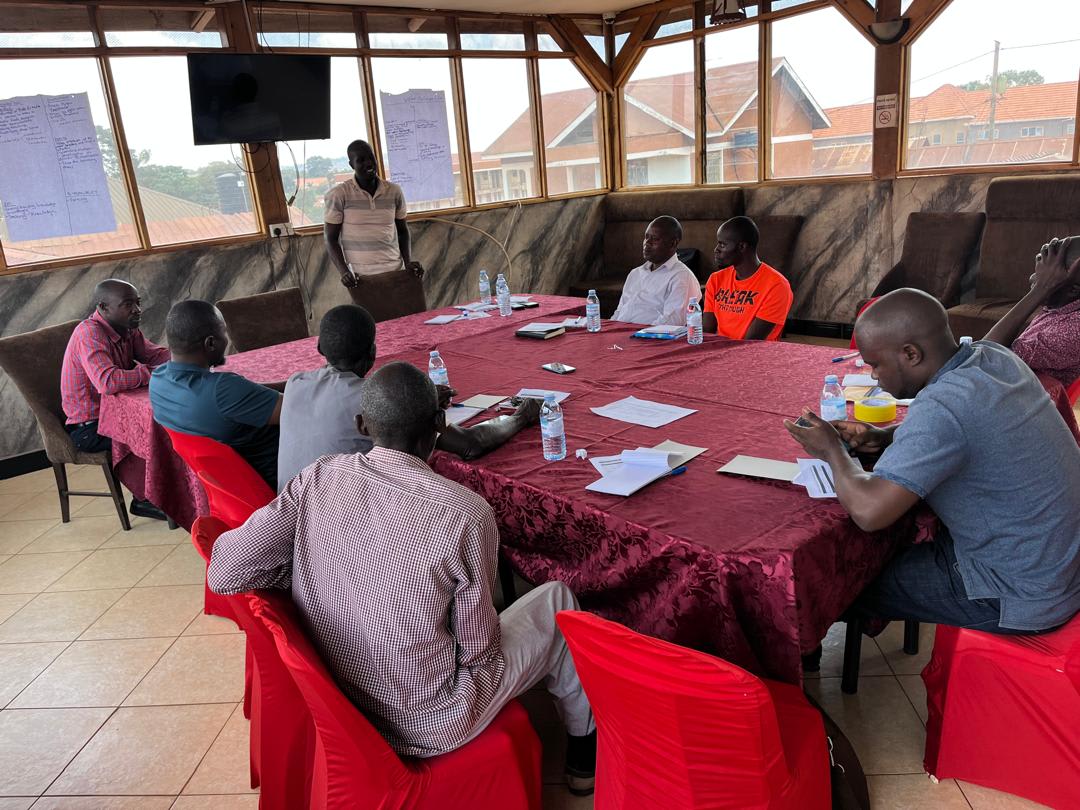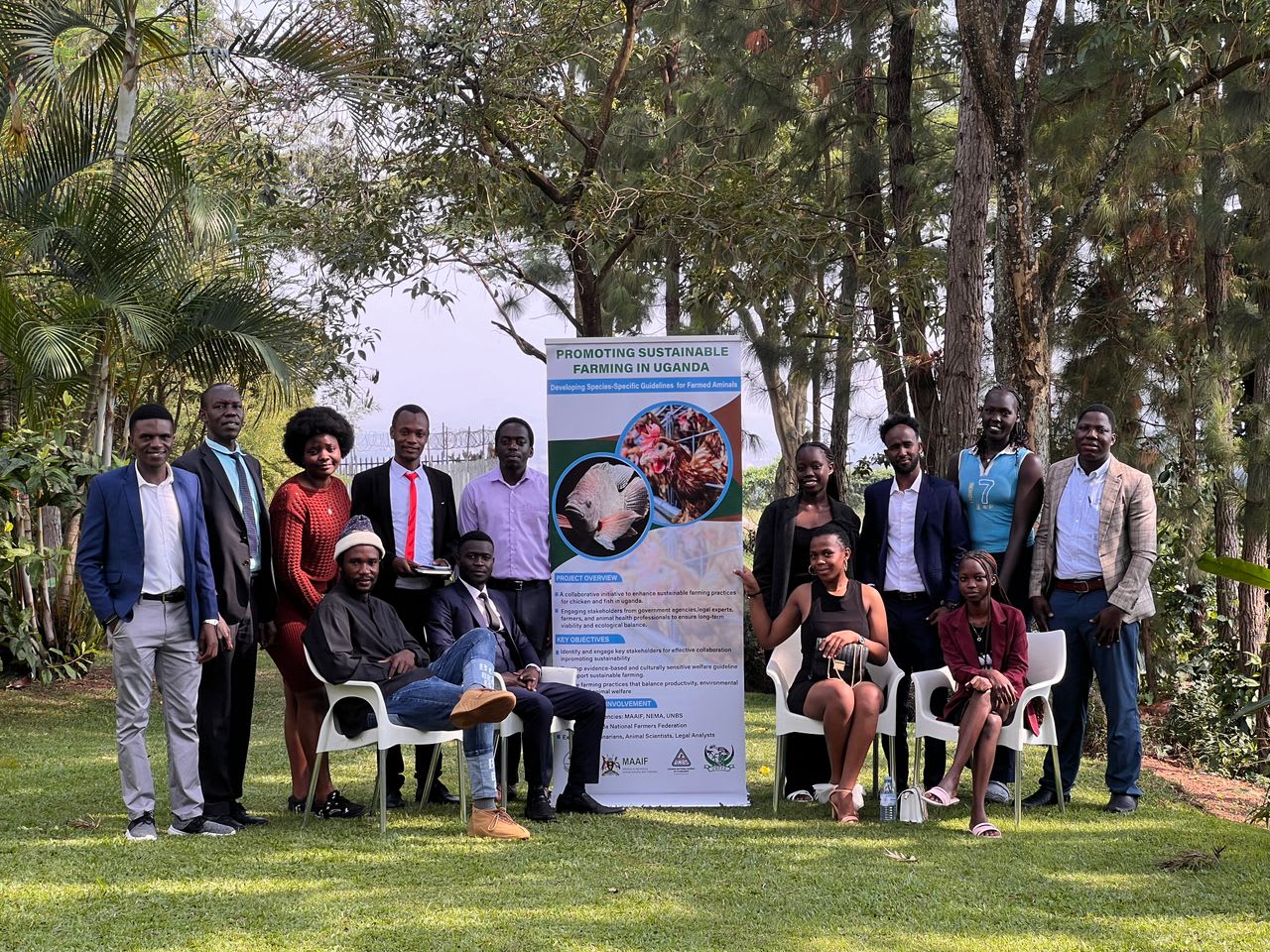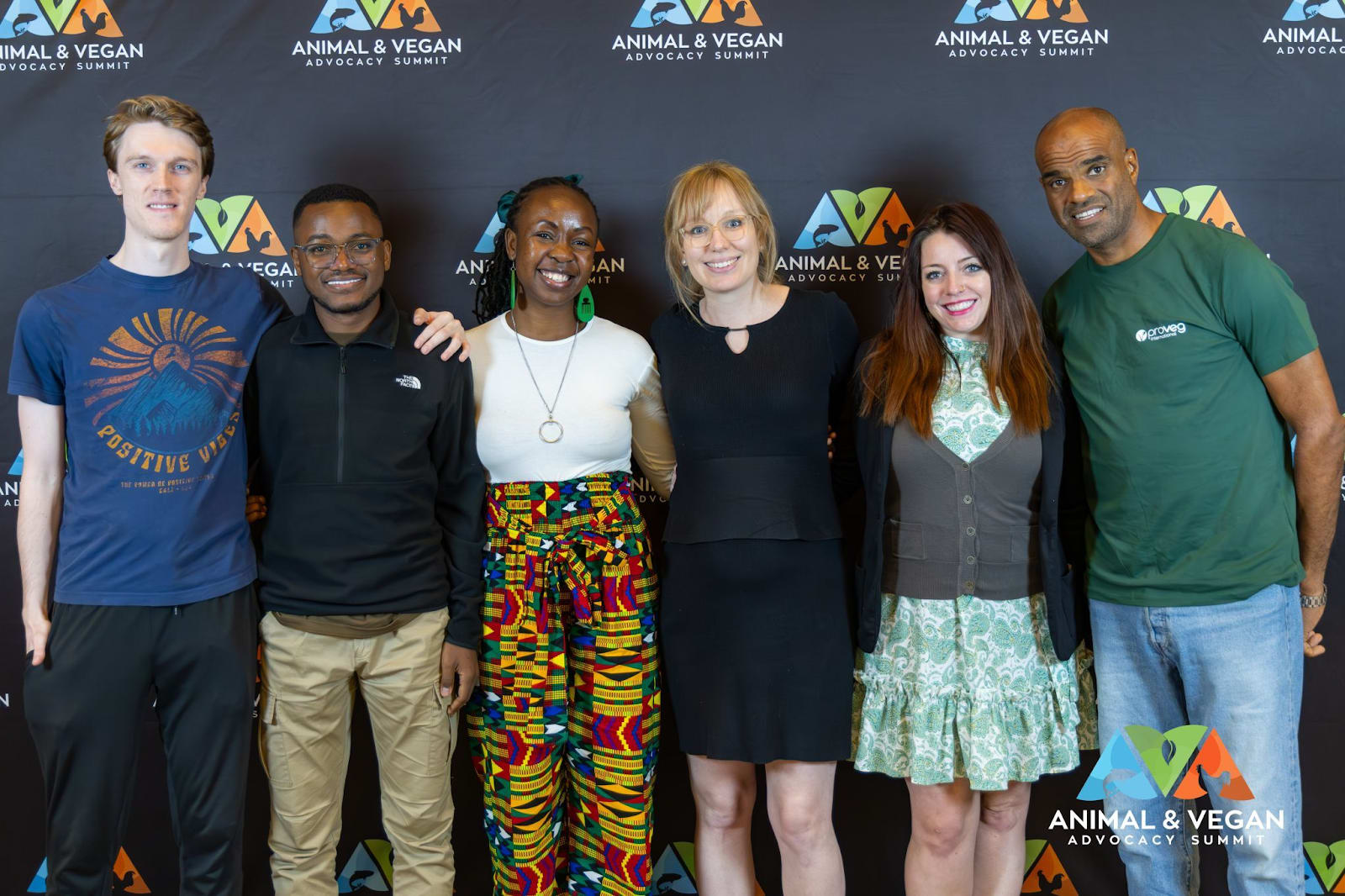Animal Advocacy Africa’s 2024 Review and Plans for 2025
By AnimalAdvocacyAfrica @ 2024-12-03T09:23 (+42)
Summary
This post reviews Animal Advocacy Africa’s work in 2024 and plans for 2025. We detail our work to foster knowledge sharing and ensure transparency, allowing stakeholders and funders to understand our achievements, setbacks, and strategic decisions.
For casual readers and those interested in specific aspects of our work, we provide key information and links to the relevant sections in this summary.
- Our purpose: We aim to reduce and prevent the suffering of farmed animals by building the animal advocacy movement in Africa before animal farming practices become more intensive.
- Our work in 2024: We completed our strategic pivot from organisational capacity-building to a training programme (TP) for individual advocates, which we expect to be more impactful.
- Training programme: The first cohort was a success. We incubated three new projects in 2024. Beyond our launched projects, other participants have pursued other promising paths to help farmed animals in Africa. Introducing a new quantitative impact measurement, we estimate running our first cohort has added ~$279K to the African farmed animal advocacy movement so far. Given the positive outcomes and feedback, we have started our second cohort in November 2024.
- Further support: Besides our TP, we provide direct, ad-hoc support to organisations and funders. We achieved significant outcomes, such as supporting the planning of the first AVA Summit in Africa, assisting funders and donors, and helping start an Effective Animal Advocacy Nigeria group.
- Contributing to the wider movement: We contributed to the growth of the African animal advocacy movement through our research and communications. We published three major research projects, are finalising a country-specific report on effective farmed animal advocacy in Nigeria, gave talks at two conferences, and more.
- Our organisation: For 2024, we set a budget of ~$179K. Expenses until the end of November amounted to ~$107K. These are slight increases compared to 2023. Our staff capacity was stable throughout 2024, at 3.5 FTE.
- Our plans for 2025: We plan to continue focusing on our TP and aim to host our first in-person retreat for advocates during the AVA Africa Summit. To find more high-quality participants, we will invest more in outreach next year. We will likely also aim to hire additional staff (or external support).
- Our mistakes and key areas for improvement: We could have done better in 2024 in enhancing our outreach, supporting our participants and projects, understanding our work’s cost-effectiveness, and overseeing our US charity registration process.
- How you can help: For 2025, we have a funding gap of ~$150K. You can contribute to our mission by donating. Beyond financial contributions, support us by connecting with us or other farmed animal advocacy organisations in Africa, introducing us to relevant individuals, offering your services, or raising awareness about the cause.
Our purpose
We aim to reduce and prevent the suffering of farmed animals by building the animal advocacy movement in Africa before animal farming practices intensify. We empower advocates interested in this issue by sharing knowledge, providing connections, and helping them build skills to start or work at impactful animal advocacy organisations.
For more on why this cause is important, please refer to our post on the rise of animal farming in Africa and our presentation at the Conference on Animal Rights in Europe (CARE).
Our work in 2024
In our 2023 review, we explained that we are shifting our focus from organisational capacity-building to a training programme (TP) for individual advocates, which we expect to be more impactful. We’ve completed this strategic pivot over the last year, and our work is now primarily structured around this programme. We’re confident in our decision after observing initial results, which we highlight below. Further activities (outside the TP) are summarised briefly.
Training programme
Overview
Our training programme equips participants with skills for effective animal advocacy, increases their understanding of farmed animal welfare issues, and explores solutions to mitigate the rise of industrial animal agriculture in African countries.
We ran the first pilot of our TP from October 2023 to June 2024, divided into three phases.
- Fundamentals:
We accepted 20 participants (out of 293 applicants) from seven countries for an eight-week programme from October to December 2023, introducing the fundamentals of effective animal advocacy. - Intermediate:
Eleven of the 20 participants proceeded to an intermediate phase, testing their fit for running their own animal advocacy projects through contained, one-off initiatives. - Advanced:
Nine participants proceeded to another eight-week programme from April to June 2024, to develop plans for starting their own full-time animal advocacy projects or organisations.
Preliminary results from our fundamentals programme were reported in last year’s review. Participants’ intermediate projects were featured on our blog here, here, and here. In this review, we highlight the most important longer-term outcomes so far and provide a first attempt at a quantitative impact estimate.
Due to positive outcomes and feedback from our first cohort, we started our second cohort on 18 November 2024. We’ve made significant updates to the programme based on feedback and internal reflection (e.g., removing the intermediate phase) and hope the programme will be even more impactful for our second cohort. We’re happy to share detailed learnings with interested readers, but won’t report them in detail here.
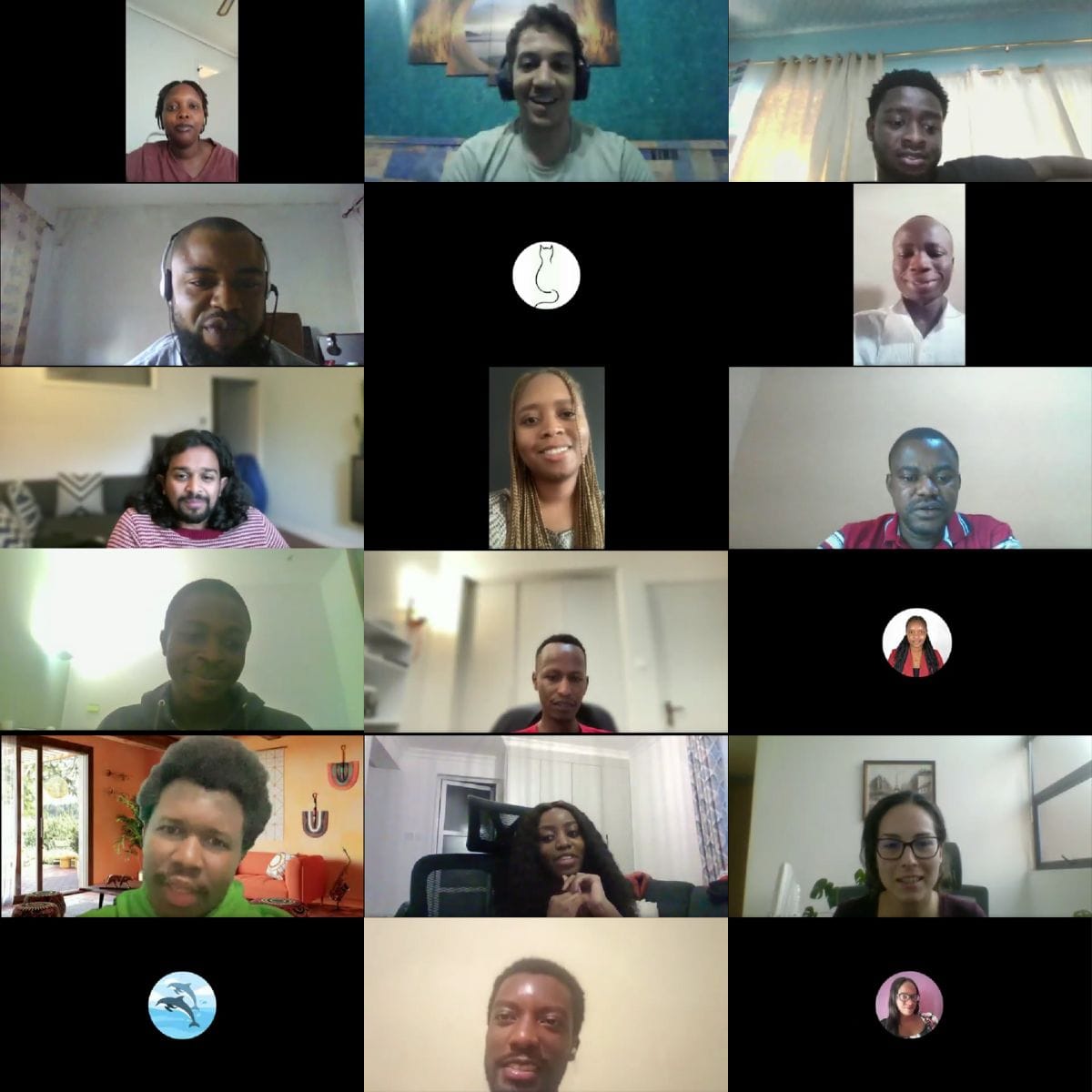
Outcomes
The key goals of our TP are to:
- Incubate new effective animal advocacy initiatives in Africa, and
- Enable participants to take on new roles in the effective animal advocacy movement.
We’re happy to report significant outcomes in both categories.
We exceeded our initial goal of launching at least two new projects or organisations through the programme, incubating three new projects in 2024, which we continue to support/mentor on an ongoing basis.
1. Sustainable Health And Resilient Environments for Development (SHARED)
- Emmanuel Awuni
SHARED aims to improve animal welfare in Ghana by establishing clear, species-specific regulations for pre-slaughter stunning. These guidelines will be built upon existing Food and Drugs Authority regulations and cover both terrestrial farmed animals (cattle, pigs, sheep, goats, poultry) and aquatic farmed animals (fish).
🔍 Progress so far:
- Conducted literature review and primary research on pre-slaughter stunning practices in Ghana to inform discussions with policymakers.
- Engaged with 10 stakeholders, including the Ministry of Health (MoH), Fisheries Commission, Food and Drugs Authority (FDA), Ghana Public Health Association (GPHA), Ghana Veterinary Medical Association (GVMA), Ghana Veterinary Council, Bureau of Halal Certification Ghana, National Secretariat of the Muslim Conference - Office of the Chief Imam (NSMC), and more.
- Scheduled a visit to Lake Volta for a scope analysis of fish farming activities. About 80% of Ghana’s farmed fish production is from this lake, managed by a small number of farmers.
⏭️ Next steps:
- Conduct the first stakeholder workshop with the Ministry of Health as the lead, supported by the Ministry of Food and Agriculture, Veterinary Service Directorate, Fisheries Commission, and others (tentatively in the 2nd week of December, 2024).
- Memorandums of Understanding (MoUs) have been discussed with key stakeholders and will be formalised after the workshop.
- Following this, a committee will be formed to initiate the next steps of the project, including drafting the policy document.
2. Aquatic Futures Africa (AFA)
- Njalira Rashid Kassim and Sylvia Nanfuka Kirumira
AFA aims to transition large-scale fish farmers in Uganda to more humane practices. It involves farmers in the decision-making process to explore, create, and implement tailored farming practices for fish welfare.
🔍 Progress so far:
- Engaged with 10+ stakeholders, including the National Fisheries Resource Research Institute, Makerere University, National Environmental Management Authority, National Agricultural Research Organisation, and the Ministry of Agriculture, Animal Industry and Fisheries.
- Conducted three stakeholder meetings with 21 fish farmers to gauge their willingness to collaborate on improving fish welfare and understand their perspectives.
- Visited 20+ fish farms to assess conditions, observe fish behaviour and welfare, and interview farmers.
⏭️ Next steps:
- Complete preliminary data analysis based on interviews and farm visits to decide on a pilot intervention to improve fish welfare.
- Start their pilot intervention with at least two fish farms, including the National Fisheries Resource Research Institute.
3. Sustainable Synergy Initiative (SSI)
- Geofrey Junior Waako[1]
SSI aims to develop enforceable animal welfare guidelines for fish and chickens in Uganda. The project emphasises sustainability, public health, biosecurity, and innovation in farming. By collaborating with government agencies, farmers, legal experts, and animal health professionals, SSI seeks to promote animal welfare standards and sustainable agricultural practices.
🔍 Progress so far:
- Conducted two stakeholder meetings with representatives from the Ministry of Agriculture, Animal Industry and Fisheries (MAAIF), National Environmental Management Authority (NEMA), Uganda National Bureau of Standards (UNBS), Uganda National Farmers Federation, legal experts, and animal health professionals.
- Secured Memorandums of Understanding (MoUs), Letters of Intent (LoIs), or Participation Agreements from all stakeholders.
- Formed two working groups to research and develop welfare guidelines for farmed animals - one for chickens and the other for fish.
⏭️ Next steps:
- Compile research on key welfare issues affecting farmed chickens and fish in Uganda.
- Develop animal welfare guidelines based on the research findings.
A fourth project is currently being incubated. Led by one of our participants, Mbamu Chama, this project will focus on cage-free corporate campaigns in Zambia, the first of its kind in the country.
Beyond our launched projects, other participants have pursued other promising paths to help farmed animals in Africa - demonstrating our achievements on our second goal: enabling participants to take on new roles in the effective animal advocacy movement.
- A participant from Nigeria took a temporary position at the One Health and Development Initiative (OHDI) to support the organisation’s cage-free work and is exploring ways to start their own project or contribute to OHDI’s work long-term.
- Another participant from Nigeria co-organises a new Effective Animal Advocacy Nigeria group (more on this below).
- Two participants from Kenya are working on influencing the ongoing trade and investment negotiations between Kenya and the US to limit low welfare imports from the US.
- One participant was accepted into AIM’s Research Training Programme immediately after our Fundamentals Training Programme and has completed it.
- Another participant will conduct research on mitigating the rise of industrial animal agriculture as a fellow of the ILINA Program.
- One participant has taken a part-time Research Assistant role at Tailored Food, supporting their mission to reduce child malnutrition by improving access to affordable and nutritious plant-based foods.
- A participant from Ghana resumed their role at Animal Welfare League as Global Partnership Manager & Corporate Campaigns Lead, applying learnings from our programme.
Impact
To hold ourselves accountable, measure our progress towards our goal, and report on our performance objectively, we decided to introduce a quantitative impact measurement for our TP, based on Animal Advocacy Careers (AAC).
“AAC adopts a meticulous approach to evaluating the impact of its programmes, mainly focusing on an innovative metric: the number of Importance- and Counterfactual-Adjusted Placements (ICAPs). This rigorous method underpins their commitment to steering more talent towards the animal advocacy movement [...]. Moreover, the evaluation of ICAPs extends to encompass people founding their own organisations or working in adjacent sectors like alternative proteins [...].”
(Stumpe & K, 2024)
AAC’s ICAP methodology lets us estimate the USD value of adding new people to the African animal advocacy movement through our programme. We won’t explain the methodology in detail here. Interested readers should refer to the two sources linked above.
To date, we estimate the programme has achieved 4.2 ICAPs, resulting in $126K added value for the animal advocacy movement. This estimate measures the impact of placing people into roles, not the impact of new organisations being started. Based on expert feedback, AAC found a 3x multiplier for founder roles to account for the counterfactual of a new organisation being started. Applying this multiplier for the three organisations started through our programme leads to a monetary value of $279K. We’re uncertain about this estimate, as it depends on the multiplier, which is based on the expected impact of the new organisations. We aim to provide a more robust estimate on the impact of our incubated projects next year, evaluating their impact on animals directly via a cost-effectiveness analysis.
Combining this estimated value with the cost of running our first TP cohort allows us to calculate a multiplier of value added to the movement. We estimate general costs at $103K, plus $53K in regranted seed funding for newly incubated projects to begin implementation. Depending on whether we include this seed funding, we achieved a multiplier of 1.8 or 2.7 on the funds we received. This means we’re roughly hitting our goal of adding two USD to the movement for every USD spent.[2] We expect to see more significant impact soon (e.g., the founder of the new Zambian project on corporate campaigns is not included yet), which will push us beyond our goal.
We’re happy to be able to report a rigorous, quantitative measurement in this yearly review in an attempt to improve our M&E - we hope it’s useful to readers evaluating our work, but we encourage everyone to interpret these estimates with caution. To provide more nuance on this quantitative impact estimate, we added an appendix to this review for those who would like to understand the limitations and how our estimates change based on different assumptions.
Further support
Apart from our TP, we provide some direct, ad-hoc support to organisations and funders. However, given our strategic pivot towards focusing primarily on our TP, this area took a smaller role in 2024. We provided much less support to organisations outside of our TP and aim to funnel advocates into our TP. We didn’t expand our advisory role to funders and other stakeholders (as mentioned in our 2024 strategy), as we focused on regranting to promising new initiatives via our TP.
We achieved some outcomes in this area and highlight the most important ones below.
- As part of the steering committee, we supported the planning of the first AVA Summit in Africa, happening 17-20 July 2025 in Nairobi, Kenya. This will allow African advocates we’ve worked with and others to connect and collaborate.
- We supported the AVA team in making travel grants for AVA D.C. and Asia Farm Animal Day 2024 by providing feedback and advice on applications from African advocates with the aim of improving their decision-making. We reviewed travel grants worth ~$35-38K.
- At the EA Nigeria Summit 2024 (more below), we helped initiate an Effective Animal Advocacy Nigeria group with currently ~35 members. They’re currently running their first public campaign to raise awareness of JBS’ $2.5 billion investment on factory farming in Nigeria.
- A funder we advised in previous years on donations to African organisations donated an additional ~$35K to four organisations in 2024.
- A grantmaker we advised in 2023 made an $8.5K grant to an African organisation we recommended. Our input was among their top 3-5 considerations in making that decision.[3]
- We helped two funders regrant ~$2.5K to two promising African organisations.
- We advised two international animal welfare/meta organisations on contributing to animal advocacy in Africa. They used our research to inform their decision-making.
The two organisations we supported and highlighted in last year’s review made significant progress this year. AWeCCA secured an $83K grant from the EA Animal Welfare Fund, a follow-up to the grant we helped them secure earlier for a government outreach project to curb industrial animal agriculture in Uganda. Animal Welfare League is advancing cage-free farming in Ghana, recently signing an MoU with the Ghana Standards Authority for the development of the first national poultry standards and amendments of egg labelling regulations. Interested readers can find more about these organisations’ progress through their publications (websites, newsletters, yearly reviews, etc.). We don’t report on this in detail since these organisations are now largely operating independently and don’t require much of our support anymore.
Contributing to the wider movement
We engaged in outreach and research to strengthen the farmed animal advocacy movement in Africa and improve information access and transparency.
The main outcomes for 2024 were:
- We published three major research projects:
- Mapping the Charitable Funding Landscape for Animal Advocacy in Africa
- Preventing Factory Farming in Africa: Strategic Considerations - a report we commissioned from Bryant Research.
- Interventions for Mitigating Industrial Animal Agriculture in Africa - a series of reports for our TP participants to choose an impactful intervention.
- We’re finalising a country-specific report on effective farmed animal advocacy in Nigeria, to be published in early 2025. This research aims to give our TP participants country-specific advice on which interventions to pursue after the programme.
- We attended six conferences and gave talks at the EA Nigeria and EA South Africa Summits. Our Nigeria presentation was published on YouTube.
- Web visits grew from 9,867 last year to ~12,500 this year (December estimated). Our strongest months were September and October, exceeding 1,500 and even reaching 2,000 monthly visits for the first time due to our TP application call.
- We maintained and updated the free databases of resources and opportunities on our site, including a substantial update to our funding opportunities database, our most-visited database. Visits to our databases have stagnated. We’re not investing significantly in expanding their reach anymore, but keep them up to date and use them internally.
- We published blog posts about our funding landscape research, our TP participants’ intermediate projects, and advice on efficient donations to LMIC organisations.
- We sent quarterly newsletters, increasing our average from ~285 recipients in 2023 to ~495 in 2024.[4]
We grew our LinkedIn followers from 1,920 to 2,448 (as of 1 December 2024).
Cameron at the AVA Summit in Washington D.C. with parts of the steering committee for the upcoming AVA Africa Summit.
Our organisation
Budget and financial information
For 2024, we set a budget of ~$179K. Our expenses until the end of November were ~$107K. These are slight increases compared to 2023 (where our budget was ~$144K and expenses were ~$97K).
The amounts above include staff salaries, participant stipends, travel, office supplies, and subscriptions. They exclude funds we regrant directly to impactful African animal advocacy initiatives. In July 2024, we provided ~$53K seed funding to SHARED and Aquatic Futures Africa for their TP-incubated projects.
Our funding still primarily comes from philanthropic funds. The largest grant this year was a $50K Movement Grant from Animal Charity Evaluators. We also received two large donations from individuals, each over $10K. We continue to see an increased number of smaller donations from individuals within the Effective Altruism (EA) and animal welfare/rights movements, especially through Giving What We Can (average amount of $87, excluding the largest donations mentioned above). This diversifies our funding pool and shows our work resonates with a broad audience, but at the time of writing institutional grants and large individual donations of at least $10K still accounted for ~92% of our funds.
We extend our deepest gratitude to our donors, whose generous contributions continue to drive our mission forward. Your support is invaluable to our efforts in improving farmed animal welfare across Africa.
Our staff and operations
Our staff capacity was stable throughout 2024, at 3.5 FTE. Our co-founder Cameron is planning to leave at the end of the year, reducing our team to three staff at 2.5 FTE. Given this reduction, increasing team capacity is a core part of our plans for 2025.
Our registration as an independent 501(c) organisation in the US is still ongoing.
Our plans for 2025
Continuing our training programme and alumni support
Based on promising results, we plan to continue focusing on our TP. We aim to complete our second cohort by April 2025 and evaluate our programme afterwards.
If positive feedback and outcomes continue, we aim to start our third cohort by year-end, continuing to improve and reiterate. We plan to continue supporting our incubated projects and host our first in-person retreat to bring together TP participants and partner organisations in 2025, around the AVA Summit in Nairobi.
Enhancing recruitment for our training programme
Our impact depends on the quantity and quality of committed participants in our TP. While we’re satisfied with our programme’s reach, we see substantial untapped talent pools. For instance, our participants are concentrated in a few countries (e.g., Kenya, Ghana, Nigeria, Uganda), while other important countries are unrepresented (e.g., Cameroon, Ethiopia, Senegal).
To find more high-quality participants, we plan to invest more heavily in outreach next year. We aim to consider a wide range of strategies based on implementation effort and expected impact, and run quick tests to identify the most promising approaches. This may include more top-of-the-funnel media outreach (e.g., local-language media in neglected countries), collaborations with other movement builders like AAC, or recruitment from top local universities.
Increasing staff capacity
With co-founder Cameron leaving at year-end, our organisation is down to 2.5 FTE of paid staff, the lowest since March 2022. While we pride ourselves on running a lean organisation and think it’s important to hire slowly, we’ll likely need to hire additional staff (or external support) in the next year.
We may extend our capacities in 2025 in three areas:
- A programme manager to support our programmes. We plan to evaluate the long-term outcomes of our first two TP cohorts by Q2 2025 and begin recruiting if we’re confident in our plans to further develop our TP (if the long-term outcomes meet or exceed internal goals).
- An operations generalist to fill the gaps left by Cameron and Sarmad (who left in 2024), focusing on operations, communications, and fundraising.
- A research staff or volunteers for further country-specific research on other high-priority countries, if we can’t manage this within our existing capacities and if the outcomes of our Nigeria research report are positive.
Our mistakes and key areas for improvement
There are several ways in which we could have done better in 2024. Here are the most important aspects:
- Last year’s review mentioned “Strengthening movement building efforts in Africa” as a priority for 2024. While we’ve made some progress (e.g., increasing TP applications by ~40% and supporting the first AVA Summit in Africa), we’ve not improved our outreach as much as we’d like to. As a result, “Enhancing recruitment for our training programme” is a key strategy pillar for 2025.
- We can better support our participants and incubated projects. For instance, we didn’t plan well for supporting launched projects with logistical items like branding and communications (e.g. finding a name, building a logo, setting up a website). This resulted in some delays in implementation. We plan to better coordinate with external services (e.g., Vegan Hacktivists, User Friendly, and Violet Studios) to support advocates in these areas.
- We lack a strong understanding of the cost-effectiveness of our work or estimates of the number of animals impacted through our advocates. While we’ve improved our M&E in the context of our strategic pivot towards the TP (e.g., through ICAPs), we lack an understanding of our ultimate impact on animals. We aim to set up a back-of-the-envelope calculation (BOTEC) or rough cost-effectiveness analysis (CEA) next year to estimate our impact.
- In our US charity registration process, we failed to respond to the authorities in a timely manner when they requested follow-up information. Without any staff based in the US, we didn’t recognise that physical letters were sent to our PO box while we waited to hear back about our application via email. We’ve now had to refile due to missing the deadline.
How you can help
Support our mission
We seek partners to accelerate the growth of the farmed animal advocacy movement in Africa. Funders and other organisations have the opportunity to significantly contribute to our cause. Individuals can support farmed animal advocacy organisations in Africa by donating, connecting us with relevant individuals, offering their services, or raising awareness. Even if donors or funders aren’t directly interested in supporting our work but believe in the importance of helping farmed animals in Africa, we can guide or assist in directing their funds to impactful initiatives.
For 2025, we have a funding gap of approximately $150,000, having raised ~50% of our budget. This includes funds we intend to raise for regranting to impactful African animal advocacy initiatives. If you support our mission to build the farmed animal movement in Africa, you can make a tax-deductible donation.
We’re incredibly grateful to our donors and supporters. At this critical juncture in African animal advocacy, every dollar donated goes a long way! Your contributions enable our work - our impact is your impact.
Give us feedback
We don’t have everything figured out and we’re just one organisation tackling a complex problem in a vast area. If you see flaws in our thinking or planning, please reach out or comment below. We always want to do better.
Connect with us
If you haven’t already, sign up for our newsletter or follow us on LinkedIn and Facebook to stay updated on our progress and the farmed animal advocacy movement in Africa.
Our 2021, 2022, and 2023 reviews are available online.
Appendix
Our ICAP and USD estimates have severe limitations and should be taken cautiously. Most importantly:
- The quantitative estimate applies a broad measurement to various outcomes and career situations. It includes diverse outcomes for different participants, such as:
- Finding a part-time job directly through our programme which they would have been very unlikely to take on otherwise (ICAP estimate = 0.17).
- Not considering animal advocacy as a career before our programme, but then pivoting to this area, leaving their job and starting their own project (ICAP estimate = 1.44).
- Certain impacts of our work are not included in the ICAP measurement. For instance:
- ICAPs capture the impact of moving people into effective animal advocacy (EAA) roles. Strategic changes within EAA are not fully captured, such as when someone refines the strategic approach of their project or organisation based on our advice or research. This is an important less tangible effect of our work that we aim to capture better in the future.
- Feedback from participants indicate that they learn a lot through the programme, which helps them become more effective advocates for animals. Our impact goes beyond placing people into new roles and getting new organisations started - we also improve our participants’ capacity to do impactful work within their roles.
- We tried to measure our impact objectively, triangulating different team members’ perspectives. But we might still be biased and an external evaluation may reach a different conclusion.
Our estimates change significantly if we alter the underlying assumptions. Below, we provide a scenario analysis on how our value added multiplier changes with different estimates for the new organisations’ multiplier and our costs.
| Multiplier for new organisations | Value added | Costs (incl. seed funding or not) | Multiplier of value added |
| 2 | $199K | $103K | 1.9 |
| $156K | 1.3 | ||
| 3 | $279K | $103K | 2.7 |
| $156K | 1.8 | ||
| 4 | $358K | $103K | 3.5 |
| $156K | 2.3 |
- ^
Geofrey was not officially part of our 2023/24 TP cohort, since we met him after our programme had already started. We decided to support him individually outside our regular TP cohort, providing similar support as to our advanced TP participants, since he was working on a time sensitive project where it was not ideal to wait until our next cohort or delay the project. We include Geofrey’s outcomes in the TP outcomes for the sake of simplicity and ease of understanding. Based on our positive experience with Geofrey, we will keep such avenues open for other advocates, but only in exceptional cases where we expect to be able to have a large impact.
- ^
We set this goal based on the estimate that AAC achieves a multiplier of 2.6. Since AAC is a slightly more mature organisation and is running effective programmes, aiming for a multiplier of 2.0 seemed reasonable for us, also given that we expect the ICAP measurement to omit significant parts of our impact (e.g., our research and strategic advice leading projects to be more impactful than they otherwise would have been - see the appendix).
- ^
While technically an outcome of our work in 2023, we report on this here for simplicity and transparency instead of editing our previous review. This changes the outcomes reported in our 2023 review as follows: “We provided advice to four foundations/grantmakers. Three (previously: two) of these grantmakers awarded grants totalling $103,500 (previously: $95,000) to organisations that we provided advice on.”
- ^
This significant increase is both the result of increasing the number of contacts on our mailing list as well as sending the newsletters to a wider audience that was already on our mailing list.
Isaac Fasipe @ 2024-12-03T17:51 (+3)
Thank you for sharing this detailed report! Happy to read through and learn. Kudos to your amazing work
Sarmad Nasarullah @ 2024-12-03T13:56 (+3)
Thanks for your continuous amazing work and the comprehensive update!
Daniel Abiliba @ 2024-12-04T06:49 (+1)
Always inspiring learning about your transparency.
Do you think your evaluation model (when fully developed) could be used by us [Animal Welfare League] to evaluate our volunteer program. Three of our volunteers have now been accepted into your training program and others ( university students) are starting university clubs?
AnimalAdvocacyAfrica @ 2025-02-28T06:36 (+1)
Thanks Daniel and sorry for the delay in our reply!
I assume you mean our ICAP impact measurement? Or do you refer to something else?
I think ICAPs could be adapted to your circumstances, yes. We actually adopted them from AAC and Hive started using ICAPs as well. However, I would recommend you focus on measuring the most important parts of your ToC. For us, movement and capacity building is at the core of our mission, so we should measure outcomes and impact in this area. For you, it may be more important to focus on the different aspects of your cage-free work.
But if you do want to work on this, just reach out via email and I can answer some questions / share more info.
- Moritz
